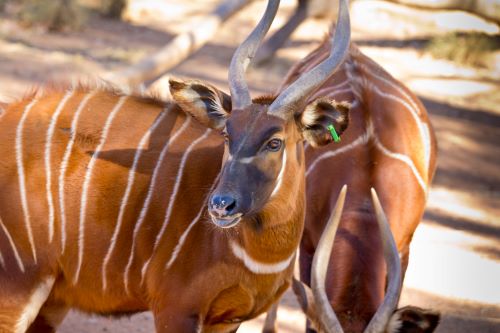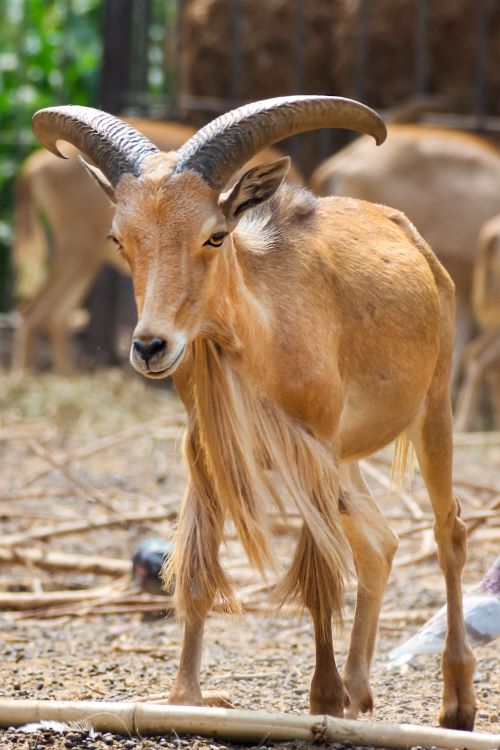
FMD information for zoos, petting zoos and fauna parks
Emergency Animal Disease hotline (24 hours): 1800 675 888.
Foot and Mouth Disease

Foot-and-mouth disease (FMD) is a serious and highly contagious emergency animal disease (EAD) and is considered one of Australia’s greatest biosecurity risks. FMD affects all cloven-hoofed animals (i.e. those with divided hooves), both domestic and wild including cattle, sheep, goats, pigs, camelids (camels and alpacas), deer and buffalo/bison. Other susceptible wild and zoo animals found in NSW include giraffe, Asian elephants, Himalayan tahr, Barbary sheep, antelopes and banteng. There are implications for other species and business operations as well. Horses, donkeys and zebras are not affected.
FMD is caused by a virus that can spread rapidly by contact with infected animals. The virus can be present and transmitted through animal waste (urine and faeces), soil, vehicles and equipment used with infected animals. It can be carried on people’s clothing and footwear, and by the wind.
Feeding food scraps and other waste material to animals susceptible to FMD can cause an infection. It can be spread by contaminated meat and dairy products, bones and untreated hides. It can survive in frozen, chilled and freeze-dried foods.
FMD is most likely to enter Australia through illegal imports of meat and dairy products infected with the FMD virus and the subsequent illegal feeding of these products (prohibited pig feed or swill) to pigs.
Although Australia is free of FMD, with confirmed detections in Indonesia in 2022, Australia is now on high alert for the disease. The social and economic effects of an outbreak of FMD in Australia would be significant. Control costs have been estimated at more than $80 billion over 10 years. An FMD outbreak is not just a threat to the Australian livestock sector. It will impact other industries, including the zoo and petting zoo industry.
What’s the risk for zoos and petting zoos?
Zoos and mobile zoos that hold species susceptible to FMD are at risk if FMD is detected in Australia. The risks may relate to the health of individual animals held by zoos, but also to business continuity. During an FMD outbreak it may be hard to source usual supplies, such as feed and bedding. It may also be difficult to access usual services such as veterinarians and other animal service workers. Preparedness for FMD can help to reduce the impact of these risks.
- There are ways to reduce the risk of an EAD such as FMD entering your NSW zoo premises, including:
- Ensuring compliance with the Exhibited Animals Protection Act 1986, and its Regulations and Standards in relation to quarantine, hygiene and record-keeping
- Completing a Zoo Biosecurity Management Planner (PDF, 5500.92 KB) for your premises to determine which inputs and entry points are a source of risk for your business and how these risks could be mitigated.
There are existing plans and arrangements in place that would be used if FMD was detected in Australia, including AUSVETPLAN Enterprise manual Zoos Version 3.0, 2014 and AUSVTPLAN Response strategy Foot-and-mouth disease Version 5.0.
FMD and Biosecurity Preparedness Workshops – June 2023

The NSW Department of Primary Industries (NSW DPI) hosted a series of workshops on Foot-and-mouth disease (FMD) and Biosecurity Preparedness for zoo, fauna park and petting zoo exhibitors and their staff.
The FMD preparedness workshops were developed to provided targeted and specific insights and training for fauna parks, zoos and mobile zoos.
Our workshop presenters included experts in animal health and welfare management, including overseas experience in managing FMD. Australia remains FMD-free and we are working to ensure zoos and wildlife parks that hold susceptible species are informed, prepared and supported in the event of an incursion.
A total of nine FMD workshops in Sydney, Port Stephens, Dubbo, Port Macquarie, Wollongong and Canberra, delivered content consistent with the principles outlined in the National Zoo Biosecurity Manual.
This unique professional development opportunity provided workshop participants to:
- learn ways to prepare for an emergency animal disease incursion in NSW
- receive a Zoo Biosecurity Management Planner and be assisted to work through the document for their work site
- had the opportunity to discuss FMD and other disease concerns with industry experts and colleagues.
If you have any further questions the workshops, please feel free to email us at animal.welfare@dpi.nsw.gov.au.
Video
NSW Department of Primary Industries staff and industry experts discuss the importance of preparing for emergency animal diseases like Foot-and-mouth disease (FMD) in zoos.
Frequently Asked Questions
More information and Factsheets
- Information for zoos & petting zoos on Foot and Mouth Disease (FMD) (PDF, 285.48 KB)
- Foot and Mouth Disease
- Information for zoo veterinarians
Other useful links
- Wildlife Health Australia – Foot-and-mouth Disease (General Information)
- Wildlife Health Australia – Foot-and-mouth Disease (Native Wildlife)
- AUSVETPLAN Enterprise manual Zoos Version 3.0, 2014
- AUSVTPLAN Response strategy Foot-and-mouth disease Version 5.0
- AUSVETPLAN Guidance document: risk-based assessment of disease control options for rare and valuable animals
- National Zoo Biosecurity Manual
- Australia’s National Zoo Biosecurity Manual self-audit Checklist

